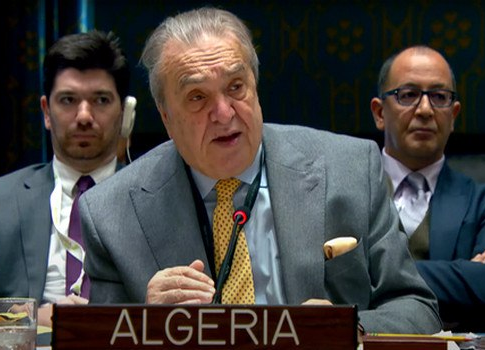In a significant address to the United Nations Security Council, the A3+ Group, comprising Algeria, Somalia, Sierra Leone, and Guyana, has expressed profound concerns over the mismanagement and misuse of frozen Libyan assets by certain international financial institutions. Represented by Algeria’s permanent UN envoy, Amar Bendjama, the group emphasized the necessity for full reparations to the Libyan people, highlighting the erosion of these assets as a critical issue demanding immediate attention.
This meeting, presided over by Algeria under its rotating presidency of the Council, comes on the heels of the Security Council’s renewal of the mandate for the Panel of Experts overseeing the Sanctions Committee on Libya, initially established under Resolution 1970. While acknowledging the imperfections of the resolution, Bendjama lauded its provisions, notably the historic decision allowing the Libyan Investment Authority to reinvest its assets to safeguard their value for future benefit.
The Libyan Investment Authority, one of Africa’s largest sovereign wealth funds, has faced challenges in preserving the value of its assets due to prolonged freezes and subsequent mismanagement. According to a report by the International Monetary Fund (IMF), the potential loss in value could significantly impact Libya’s economic recovery efforts, reiterating the urgency emphasized by the A3+ Group.
Specialists in international finance and Libyan politics echo the A3+ Group’s sentiments. Dr. Ahmed Al-Mismari, a Libyan economist, commented, “The mismanagement of Libyan assets not only undermines the country’s fiscal stability but also deprives its citizens of vital resources necessary for rebuilding and development.”
Moreover, Bendjama highlighted advancements in delisting individuals and entities who no longer fit the criteria under the sanctions, a move expected to streamline the sanction committee’s processes. This effort, coupled with the inclusion of Libya’s permanent mission in New York in correspondence, is seen as a step towards enhancing transparency and communication.
The Security Council’s decision to amend paragraph 9 of Resolution 1970, enabling member states to provide technical assistance for a coordination center, aligns with requests from the Libyan Presidential Council. This initiative aims to foster a structured, collaborative approach between international bodies and Libya’s legitimate government.
On the political front, the A3+ Group reaffirmed its commitment to a Libyan-led peace process, underlining the need for the withdrawal of foreign forces and mercenaries. This stance is critical for ensuring Libya’s sovereignty and territorial integrity, areas where the international community’s support is crucial.
In his concluding remarks, Bendjama urged the Security Council to facilitate an environment conducive to free and transparent elections, positioning the Libyan people at the forefront of determining their future. “The A3+ Group stands in solidarity with the Libyan citizens who have suffered due to past missteps and stresses the importance of empowering them through meaningful political processes,” he stated.


